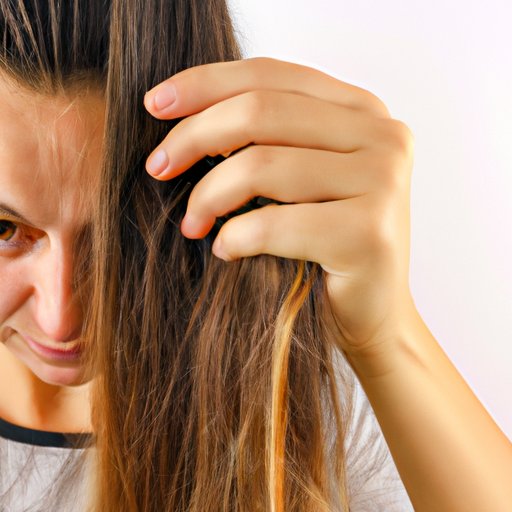Introduction
Greasy hair can be an embarrassing problem, but many people are not sure why their hair gets greasy or how to stop it. In this article, we will explore the definition of greasy hair, the science behind it, and the various causes and solutions available. By understanding the biology and chemistry of greasy hair, as well as examining diet, genetics and lifestyle habits, you can learn how to manage and avoid it with simple strategies.
Investigating the Causes of Greasy Hair: A Comprehensive Guide
The Science Behind Greasy Hair: Exploring the Biology and Chemistry
Before we look at the causes of greasy hair, it is important to understand the science behind it. Greasy hair is caused by an overproduction of sebum, which is an oily substance produced by the sebaceous glands located in the scalp. Sebum is necessary to keep the scalp and hair healthy, but when too much is produced, it can make the hair look greasy and heavy, and may even cause it to become clumpy and difficult to style.
The production of sebum is largely determined by hormone levels, such as testosterone and androgens, which stimulate the sebaceous glands to produce more sebum. Additionally, the size and shape of the hair follicles also play a role in how much sebum is produced, as larger follicles have more sebaceous glands and therefore produce more oils.
What Causes Greasy Hair? Examining Diet, Genetics and Lifestyle Habits
Now that we understand the science behind greasy hair, let’s take a closer look at some of the factors that can contribute to its occurrence. These include diet, genetics, stress, and environmental factors.
Dietary Factors
Your diet can have a major impact on the health of your hair and scalp, including the amount of sebum produced. Certain foods, such as those high in fat, sugar, and processed ingredients, can increase sebum production, leading to greasier hair. Eating a balanced diet full of whole grains, leafy greens, fruits, and lean proteins can help keep your scalp and hair healthy.
Genetics
Genetics can also play a role in determining how much sebum your scalp produces. If one or both of your parents have greasy hair, then you may be more likely to have it as well.
Stress
Stress can also contribute to greasy hair. Stress hormones can increase sebum production, making your hair appear greasier than usual.
Environments
Finally, environmental factors such as humidity, air pollution, and hard water can also contribute to greasy hair. Humidity can cause your scalp to sweat more, leading to increased sebum production, while air pollution and hard water can disrupt the natural oil balance of your scalp and hair.
Tips for Reducing Greasy Hair: Home Remedies and Professional Solutions
Fortunately, there are several ways to reduce greasy hair. Here are some tips to help you get started.
Shampooing
Using a mild shampoo every other day can help remove excess oils from the scalp without drying out the hair. Look for shampoos specifically formulated for oily hair, as these contain ingredients that are designed to help reduce sebum production.
Conditioning
It is important to use a light conditioner after shampooing to help keep the hair hydrated and prevent it from becoming dry and brittle. Avoid using conditioner on the scalp, as this can contribute to greasiness.
Styling Products
Using styling products, such as mousse and hairspray, can help give the hair volume and texture without adding extra oils. Look for products that are specifically designed for oily hair.
Natural Remedies
There are also several natural remedies that can help reduce greasiness. Applying diluted apple cider vinegar to the scalp can help balance the pH of the scalp, while massaging the scalp with aloe vera gel can help reduce inflammation and sebum production. Both of these remedies should be used once or twice a week.
Professional Treatments
If home remedies and over-the-counter products aren’t enough, there are professional treatments available. Your doctor may recommend medications or topical treatments that can help reduce sebum production and keep your scalp and hair healthy.
Conclusion
Greasy hair can be a frustrating problem, but it is possible to manage and even prevent it with the right strategies. Understanding the biology and chemistry of greasy hair, as well as examining diet, genetics and lifestyle habits, can help you identify potential causes and find the right solutions. With the tips outlined here, you can start reducing greasiness and restoring the health of your hair.


